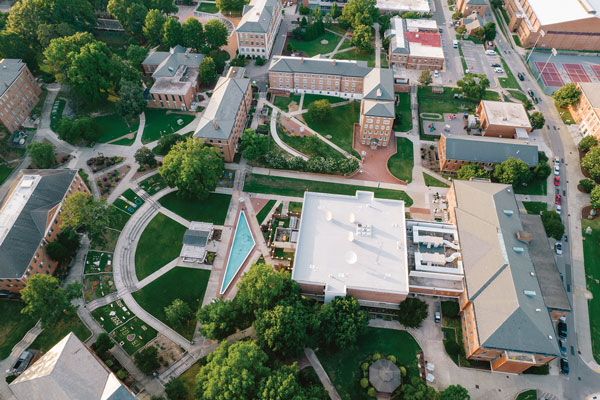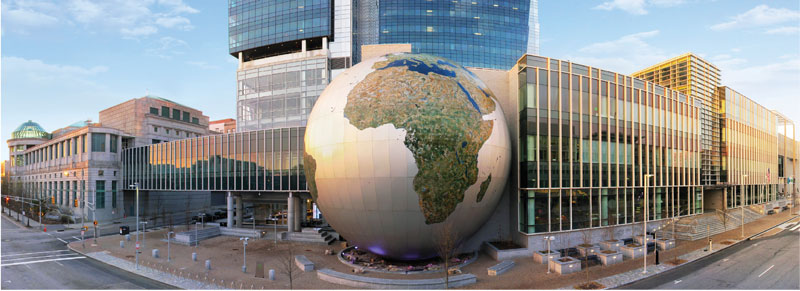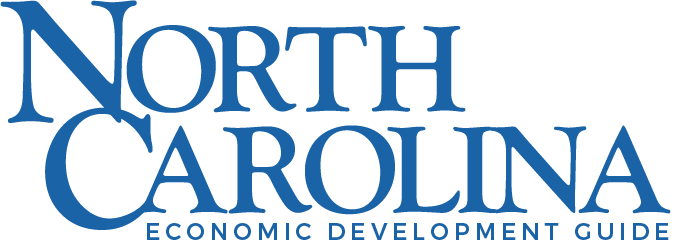Focus: Triangle region, plugged in
Technology companies — from startups to global players — are attracted to North Carolina’s Triangle region. Its combination of research, skilled workforce and quality of life has made it one of the nation’s fastest-growing metro areas.
—by Katherine Snow Smith
Apple’s eye has long been on North Carolina. The Cupertino, Calif.-based technology giant, whose iPhones and other inven-tions regularly change how we communicate and recreate, has a presence in the state. It always seems to be in the running for Apple’s expansions, and it won a big one in April 2021.
Two years after Apple chose Austin, Texas, over North Carolina and a handful of other sites for a $900 million corporate campus, it selected a corner of Research Triangle Park near Cary and Morrisville for a massive 1 million square foot research and development, operations and engineering hub. Part of a $1 billion investment statewide by 2032, it will only use renewable energy and create 3,000 jobs with an average salary of more than $187,000 in Wake County, where the current average annual wage is almost $64,000. If the company meets performance milestones, the state’s Job Development Investment Grant program will reimburse it about $845 million of the almost $2 billion in new tax revenue over 39 years.
The move was a homecoming for Apple’s chief operating officer, Jeff Williams. “As a North-Carolina native, I’m thrilled Apple is expanding and creating new long-term job opportunities in the community I grew up in,” he said at the announcement. “We’re proud that this new investment will also be supporting education and critical infrastructure projects across the state. Apple has been a part of North Carolina for nearly two decades, and we’re looking forward to continuing to grow and a bright future ahead.”
Apple’s investment includes more than $100 million to support schools, economic development and community initiatives statewide. It will retain its 1,100 employees already working in North Carolina. Some of them are in Catawba County, where it will spend about $450 million to expand a data center over the next decade.
Apple’s latest commitment joins Google’s recent announce-ment of 1,000 jobs at a Durham engineering hub, part of a $7 billion investment nationwide, and Redmond, Wash.-based Microsoft’s $47.5 million investment in Morrisville, not far from Raleigh-Durham International Airport, where it’s adding 500 workers, mostly software engineers and developers. And those are on top of the region’s growing biotechnology sector. None of them are truly a surprise. The Triangle, anchored by Raleigh, Durham and Chapel Hill, always has been a technology hotbed. It’s home to the first $1 billion open-source software company — Red Hat — which operates as an independent subsidiary of IBM, and Epic Games, creator of the ubiquitous “Fortnite,” which has more than 350 million registered users. But there always is room for more.
Christopher Chung, CEO of the Economic Development Partnership of North Carolina, the public-private effort that recruits businesses, helps current ones expand and promotes tourism, says Apple’s globally recognized name and size of its latest commitment will help it market the state as the place to start, relocate or expand a technology business. “We expect other businesses — particularly in Silicon Valley and even globally — to take notice of this major announcement,” he says. “And that will definitely boost our future recruitment efforts.”
And it’s not only about relocations or expansions by big tech companies. Apple’s project will make way for more startups, too. “When Apple puts such a major presence here it’s saying something about the fertility of the technology ecosystem,” Chung says. “That is a supreme vote of confidence in the business climate, in the availability of talent and how [Apple] sees this place as a location to recruit people who don’t live here today. They really need to be assured the local community is providing a good talent pool to draw from. They also have to be convinced if they are making an offer to someone moving from Boston or Silicon Valley or Austin, this is an attractive place for someone to move with his or her family or on their own.”
Technology companies find many reasons to start, relocate or expand in North Carolina’s Triangle region. Michael Haley, executive director of Wake County Economic Development, points to four that he believes attracted Apple: talent, diverse regional economy, quality of life and educational ecosystem. “Our three tier-one research universities … they are a distinguishing factor,” he says. “We also have three [Historically Black Colleges and Universities] with N.C. Central University in Durham and Shaw University and St. Augustine University in Raleigh.”

N.C. Central University, one of the three Historically Black
Colleges and Universities, is in the Triangle region.
The Triangle region takes its name from the geographical relationship of its three esteemed research universities and their hometowns: N.C. State University in Raleigh, University of North Carolina in Chapel Hill and Duke University in Durham, where Apple CEO Tim Cook earned his master’s degree in business administration. The proximity of those schools also laid the foundation for Research Triangle Park in 1959. It has grown to become the country’s largest research park — 7,000 acres.
The close concentration of three HBCUs was important to Apple, too. “It was something we emphasized on a state and local level as part of the pitch,” Chung says. “Technology companies recognize they have some work to do when it comes to diversity of their workforce. This has really come to light in the last few years. Companies like Apple are very interested in developing relationships with HBCUs.”
Workforce development, customized to the needs of each company, is a hallmark of the 58-campus North Carolina Community College System. Its largest — Wake Technical Community College — is serving the workforce training needs of technology companies with its 94-acre RTP campus, which opened in 2018 and will eventually have an enrollment capacity of 7,000 students. It already offers a variety of programs, including cybersecurity, business analytics, data storage and virtualization, and network management. Students can use these skills to land jobs or as the foundation for further study, either earning an associate degree at Wake Tech or transferring to a college or university for a four-year degree.
Cisco Systems, Lenovo Data Center Group, AT&T and Fidelity Investments donated a combined more than $500,000 for equipment, technology and scholarships at the RTP campus. Lenovo, for example, has an average of 20 Wake Tech students in paid work-based learning programs at a time. And in the past two years, 25% of them have become full-time employees upon graduation. “That RTP campus is precisely focused on the disciplines and training in the [information-technology] space such as cybersecurity,” Haley says. “It’s designed so that employers and the school can create curriculum based on the skills companies need their employees to master.”
N.C. State’s Centennial Campus offers research opportunities and partnerships that benefit students and businesses. More than 70 government and nonprofit entities have a presence on the campus and all include students and faculty in their research and development. Over the past few years, more than 1,000 of those students have been hired as interns or full-time employees. “There’s high demand for the talent that’s out there,” says Mike Schmidt, N.C. State’s associate vice chancellor for partnerships. “Companies are finding they need to be a lot more strategic in their relationships with universities to gain access to that talent. Most of the companies that are here on campus have a leg up. They are getting daily access to students and building almost a three-year job interview with the talent they want to recruit.”
Centennial Campus enhances the success rate of the startups it assists. Large companies that grew from small startups there include Red Hat and Phononic, which develops solid-state heating and cooling technology in Durham. The National Security Agency and U.S. Department of Agriculture are among the government tenants working with N.C. State to develop technology and solutions. The successful concept is being used as the model for East Carolina University’s millennial campus in Greenville.

The North Carolina Museum of Natural Sciences, one of the state’s most-visited museums, is home to the 72-foot tall Daily Planet, a hollow steel globe covered in high-resolution satellite photos of the Earth.
A steady pipeline of highly skilled entry-level employees complements an existing critical mass of talent already working in the Triangle’s technology sector. “From a worker standpoint, you do not want to work for the only company in your industry,” Haley says. If a job doesn’t work out or you’re ready to go to the next level, then you need choices. “You want to know there are 15 other companies within a few miles that attract the same skill set and knowledge base,” he says.
The Triangle’s quality of life attracts residents and retains graduates. The evolution of downtown Raleigh over the past couple of decades has produced the type of urban living that’s popular with tech companies and their employees. “They all want to walk to work and bring their dog,” says Tim Dockery, head of The Crown Companies and a developer of the 170,000-square-foot workplace for software creator Citrix that opened in a former downtown warehouse in 2014.
Though Raleigh has always bustled with state-government workers, lawyers, bankers and business people, it shut down at 5 p.m. on most days. That changed when small businesses, residential developers and startups began dipping their toes into the city’s urban core at the turn of the century. Soon large employers, many in the tech space, became interested. Since 2015, more than 8,479 new residential units have gone up in downtown along with 2,102 hotel rooms, according to the Downtown Raleigh Alliance. Add to that, 3.5 million square feet of new office space and 732,000 square feet of new retail. Sidewalks are now full of people, café tables and dog bowls.
Wake County, at the heart of the Triangle, has more than a million residents, and more arrive every day. A WalletHub Study in August 2021 ranked the Durham and Cary real-estate markets as the seventh and 12th, respectively, hottest in the country. “There’s a reason why this community is one of the fastest growing metro regions in the United States,” Haley says. “There’s a lot of job opportunity, obviously, and there’s a really high quality of life. We are a community that invests in ourselves. We invest in open space. We invest in our schools. We invest in parks and greenways. Those are the quality-of-life components that provide that ‘stickiness factor.’ People come here and want to stay.”
Wake County voters approved a half-cent sales tax to finance public transportation improvements in 2016. Those included a Bus Rapid Transit system with 20 miles of dedicated lines. Each will radiate from downtown Raleigh, providing efficient transit to locations throughout the county. The 5-mile New Bern Avenue line, for example, is slated to open in 2024. Federal funds will cover about $35 million of its $76 million cost.
Raleigh is investing in more ways. It paid $52 million for a former state hospital just south of downtown in 2015. It became Dix Park, whose 308 acres makes it one of the country’s largest public greenspaces. Shady groves of trees, ball fields, meadows and an all-faiths chapel attract hundreds of visitors each week. A field of sunflowers is popular in social media posts. Guided walking tours, yoga in the park and artist talks take place regularly. Long-term plans continue to evolve but include a children’s museum, nature trails and a waterfall.
There’s a long history of public and private funding of the arts in the Triangle. It’s home to the North Carolina Symphony, Carolina Ballet and North Carolina Museum of Art as well as many smaller museums and arts performance groups.
Sporting events are popular, too. College basketball rivalry Tobacco Road runs right through the region. It’s home to the NHL’s Carolina Hurricanes, who won the Stanley Cup in 2006. And the North Carolina Courage, a professional women’s soccer team based in Cary, was league champion in 2018 and 2019. The team’s majority owner is information-technology entrepreneur Steve Malik, while tennis great Naomi Osaka is an investor.


